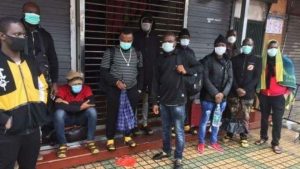The two-month lockdown in Wuhan, the Chinese city where COVID-19 first emerged, has finally been lifted, a clear sign that the epidemic in China has been mostly contained. Having said that, however, Chinese authorities are worried about a second wave of COVID-19 infection from imported cases – and, apparently, especially cases related to individuals of African origins.
According to a note to Beijing from African ambassadors and news reports on both local and social media, Africans in China, especially those in the southern Chinese city of Guangzhou, have been ejected from hotels at night, arrested, and even deported. Their passports were seized, and they were threatened with the revocations of their visa. African ambassadors also emphasized that their citizens in China were being forced to undertake COVID-19 tests multiple times and forcibly put into 14-day quarantine among other inhumane treatments, even when these individuals had no recent travel history or close contacts with individuals who were COVID-19 positive.
Chinese authorities are tightening their scrutiny of foreigners, even while denying any forms of discrimination. However, Chinese news reports and social media posts show otherwise.
At the peak of the outbreak in Wuhan, some African nations decided not to evacuate their students from China, as an expression of their confidence in Beijing’s ability to manage the pandemic. Here, African nations emphasized their belief in, and willingness to maintain friendship with, Beijing amid the COVID-19 outbreak. It is important to underscore that friendships and partnerships between African nations and China are mutual rather than a one-way affair. China’s discrimination and mistreatment toward Africans are degrading to the same people China claims as valued business and trading partners.
Africa is a key piece of China’s strategy for long-term economic growth. Over time, Beijing has created and maintained bilateral trade agreements with African countries while developing unequal trade conditions. For example, China has imported illegal African timber and exported both cheap light products, such as clothing and expensive high- and new-tech products to Africa. China’s economic success, in part, depends on maintaining exploitative trading relations with their African partners – wages are relatively low in African countries, so the unit import cost for China is low and the export cost is high.
Racial discrimination against African communities in China has harmed China-Africa relationships and sparked international concerns. Even if Beijing doesn’t care about the moral argument for acting, cold economic calculus means that Chinese authorities should act swiftly to halt any discriminatory policies. The authorities should also take a lesson from the outrage over the COVID-19 cover-up in Wuhan and apologize for the mistreatment of Africans in China rather than deny relevant accusations. Otherwise, more reports on China’s discrimination against those of African origins will further demonstrate the irresponsibility and unreliability of China as a business, trading, and diplomatic partner.
Jason Hung is a freelance columnist at South China Morning Post.

































